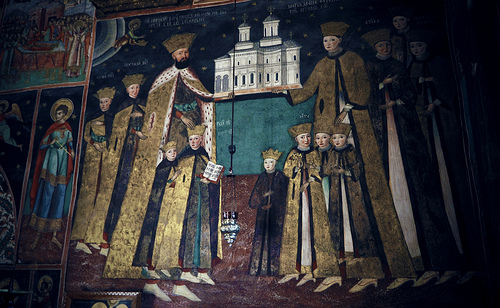We run our website the way we wished the whole internet worked: we provide high quality original content with no ads. We are funded solely by your direct support. Please consider supporting this project.

The Problem with Mixing Church & Government
Image by fusion-of-horizons via Flickr
Some people insist that the only reason that neither Jesus nor anyone else in the first several centuries of the church tried to dominate the political system of their day was because they were a small minority of people living in a nondemocratic and hostile environment. By contrast, the argument goes, American Christians are a sizable group living in a rather friendly, democratic land, and we are able to at least improve, if not someday dominate, our government and culture. And since to whom much is given much is required (Lk 12:48), do we not have a spiritual and moral obligation to use this opportunity to the full advantage of the kingdom of God? In this light, the argument concludes, to shirk the opportunity to rule because we are afraid of compromising our kingdom calling is irresponsible, pharisaical, and cowardly. The argument seems to make so much sense.
The church during the time of Constantine explained away the self-sacrificial love and humility of Jesus and the early church in just this fashion. Instead of constituting the essence of the kingdom of God, the self-sacrificial and humble example of Jesus and the early church was understood to be merely a provisional inconvenience. Now that God had supposedly given the church power to rule, they reasoned, it just made sense to use it. For they, being the people who knew the truth, obviously knew best how to rule others.
Yet what did this line of reasoning accomplish? It produced centuries of barbaric bloodshed—in Jesus’ name. Beyond the tragedy of millions of people being brutally murdered, the fact that this was done under the banner of the cross has harmed global missions for centuries. And the church lost its power along the way.
Whenever Christians have gotten what so many American evangelicals today are trying to get—namely, the power to enforce their righteous will on others—it eventually harms the church as well as the culture. The lesson of history, a lesson the Devil has known all along, is this: The best way to defeat the kingdom of God is to empower the church to rule the kingdom of the world—for then it becomes the kingdom of the world! The best way to get people to lay down the cross is to hand them the sword!
The kingdom of God is not about coercive “power over,” but influential “power under.” Its essence is found in the power to transform lives from the inside out through love and service.
When kingdom-of-God citizens aspire to acquire Caesar’s authority to accomplish “the good,” we sell our kingdom birthright for a bowl of worldly porridge (Gen 25). To the extent that we pick up the sword, we put down the cross. When our goal as kingdom people becomes centered on effectively running a better version of the kingdom of the world, we compromise our calling to be faithful to the kingdom of God.
—Adapted from The Myth of a Christian Nation, pages 93-95.
Category: General
Tags: Church, Constantine, Government, Myth of a Christian Nation, Politics, Power
Topics: Ethical, Cultural and Political Issues
Related Reading

How Much Does the Cross Really Matter?
The cross is as foolishness and weakness to nonbelievers, but Paul wrote that to those who are being saved it is both “the power” and “wisdom of God” (1 Cor 1:18, 24). In sharp contrast to the controlling power and wisdom that has been ascribed to God or the gods throughout history—including in much of…

Election Day Communion Resources
Rachel Held Evans posted today about Election Day Communion and provided resources for those of you who cannot attend one of these services. Let’s all be praying today for unity among the saints and blessings of peace regardless of the outcome of this election.

Let’s Remember
In light of the events in the last few days involving attacks on American diplomats in foreign countries (and the ensuing political conflict), let’s remember one thing: Our fight is not with flesh and blood. As Christians, our real enemy is not Libyans or Egyptians or Muslims or President Obama or Governor Romney. Our enemy…

5 Differences Between The Kingdom of God and the Kingdom of the World
Image by matthijs rouw via Flickr The kingdom of God looks and acts like Jesus Christ, like Calvary, like God’s eternal, triune love. It consists of people graciously embracing others and sacrificing themselves in service to others. It consists of people trusting and employing “power under” rather than “power over,” even when they, like Jesus, suffer because…

Does the Bible forbid interracial marriages?
Absolutely not! Racist Christians used to argue against interracial marriage by quoting Old Testament passages that prohibited Jews from marrying non-Jews. This prohibition had nothing to do with race, however. In fact, there was no concept of different “races” until white Europeans invented it during the Colonial period, partly to justify their enslavement of other…
